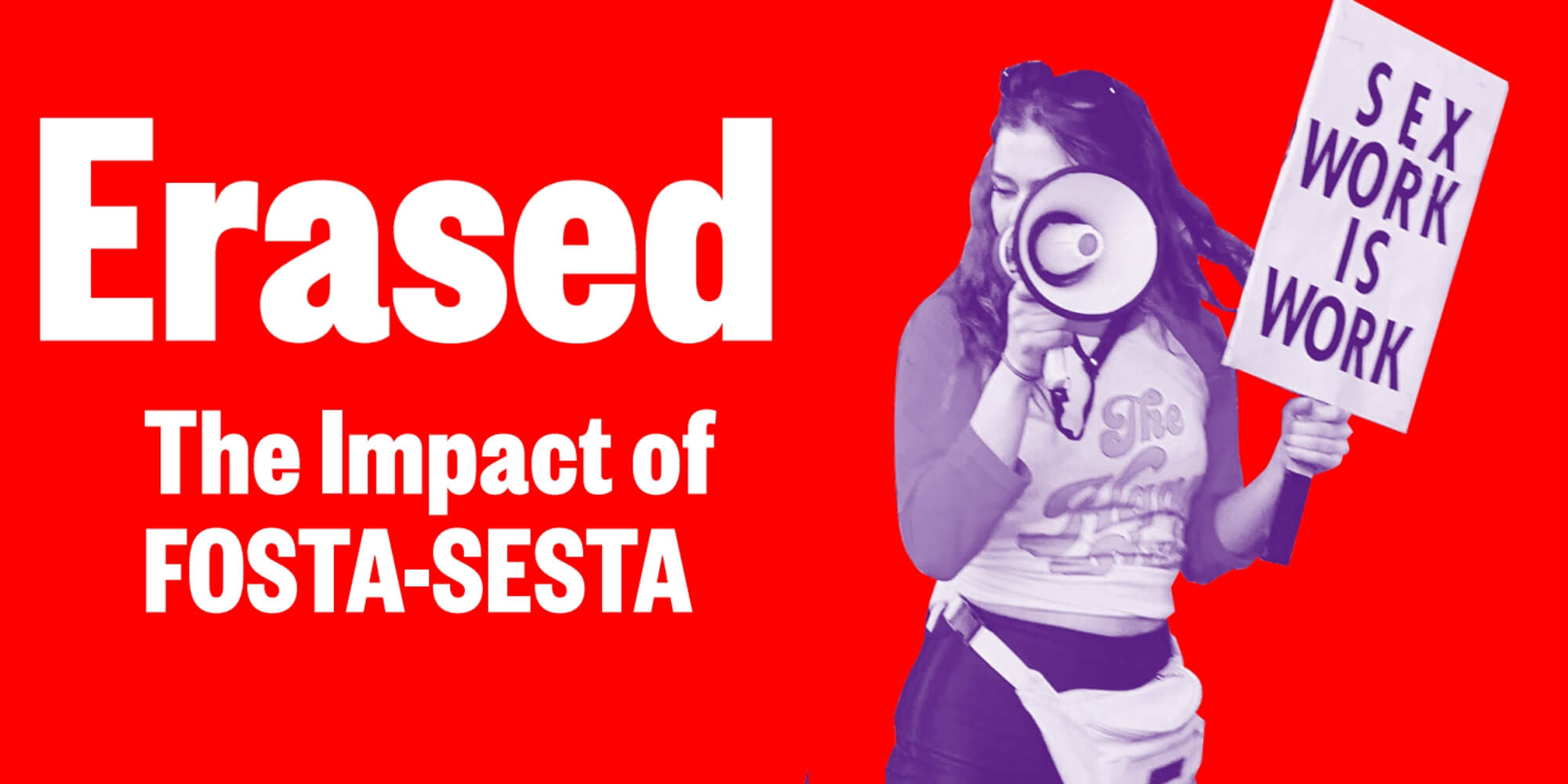Two years after SESTA-FOSTA became law, a sex worker-led research initiative has confirmed that the "anti-sex trafficking" law actually renders sex workers "more vulnerable to human trafficking and exploitation." The study, released this week, is one of the first to confirm SESTA-FOSTA's harm through direct correspondence with those affected.
Erased: The Impact of FOSTA-SESTA is a 53-page study penned by sex workers' rights tech collective Hacking//Hustling. The study features two survey groups, online sex workers and street sex workers who have limited technological access, and features self-reported data via a participatory action research model. Cowriters Danielle Blunt and Ariel Wolf authored the study with help from Naomi Lauren of the Western Massachusetts-based survival and street-sex worker advocacy group Whose Corner Is It Anyway.
Erased is steered by sex workers and organizers in its entirety. Blunt works as a professional dominatrix and has a master's degree in public health, Wolf is a researcher and former sex worker who previously worked with the Red Umbrella Project, and Lauren is both an organizer and stripper. The project began while Blunt was working on her master's, she told the Daily Dot. Simultaneously doing sex work in the post-SESTA-FOSTA world and studying how it impacted her community "really lit a fire under [her] ass" and emphasized why she needed to publish the study's findings "as quickly and safely as possible," Blunt said.
"This report was largely dependent on volunteer labor, funded primarily by our own sex work," she explained. "As a sex worker who worked before and after FOSTA-SESTA, it also proved to be challenging to work on this project in a volunteer capacity as my own income has been feeling effects of losing access to online spaces."
Among online sex workers, respondents commonly considered SESTA-FOSTA an "overbearing" and "paternalistic law" that haphazardly attempts to abolish the sex industry "with no regard for the safety of people in the sex trades." According to the study, 72.5% of online respondents who rely on sex work for their income said they have since faced "increased economic instability" after SESTA-FOSTA, and 33.8% reported an increase in violent client experiences. Nearly a quarter said their housing circumstances were impacted after Backpage's closure and SESTA-FOSTA went into law, and one-fourth of online sex workers with chronic illnesses reported a flare-up in symptoms.
Additionally, sex workers reported that they were "reluctantly" relying on workplaces with less autonomy after both Backpage's closure and SESTA-FOSTA's introduction; 40% of online users said over half of their clients were from Backpage. "I lost all my income, lost my clients, and was forced to go back to working a 9 to 5 job that is ableist and doesn't accommodate my disabilities/health issues," one online sex worker told the study. "Sex work gave me freedom and flexibility before I lost it all."

Online sex workers rely on the internet to share harm reduction resources, such as "bad-date lists" providing information on violent clients or those connected to law enforcement. After SESTA-FOSTA, 21% of respondents said they could no longer access the harm reduction resources that they previously used. Adding to safety concerns, the remaining few social media websites that have not removed sex workers have gained further power. Both Blunt and Wolf insist that social media platforms need to stop discriminating against sex workers.
"Platforms need to do a better job of keeping marginalized communities safe on their platform. In our report we have some suggestions for platforms on how to do so. If a troll is able to weaponize your content moderation system to silence the voices of marginalized communities, your content moderation system has failed," Blunt told the Daily Dot. "Of course there are benefits to community-only spaces, but I shouldn’t have to rely on siloed platforms. That is not where the clients are. Shouting into an echo chamber is not how we shift discourse in media."
Erased also reveals different experiences between online and street-based sex workers. Among offline sex workers surveyed by Whose Corner Is It Anyway, the "overwhelming majority" did not necessarily understand SESTA-FOSTA, nor did they report "any direct impact on their work or safety" from the law's passage. Offline workers said "they were already dealing with traditional law enforcement-based criminalization and didn't experience as direct an effect of a law regulating digital platforms." This suggests an issue that sex workers' rights activists and reporters have long brought up: Sex work is an intersectional issue. By definition, sex workers will experience different levels of police violence, financial instability, and workplace exploitation based on their identity.
"Journalists and the public also need to understand that the most marginalized voices in the sex work community are often dealing with a myriad of other forms of oppression based on their race, sexuality, gender expression, or disability status," Wolf told the Daily Dot. "Writing stories that highlight the need for better systematic support is necessary to improve the lives [of] people whether they're sex workers or not."

This doesn't mean SESTA-FOSTA hasn't impacted street work at all. Nearly half of offline respondents said there were more street-based workers since Backpage's removal and SESTA-FOSTA. And online sex workers are now more vulnerable to violence, particularly from police: 36% of online sex workers and 20% of street workers said they faced increased violence. Online censorship and SESTA-FOSTA's enforcement have "scattered online communities," leaving sex workers "without the few resources they previously had to find other sex workers," Wolf told the Daily Dot.
"The relatively small amount of academic research on sex work has been overwhelmingly reductive, and has contributed to the paternalistic view that all sex work is inherently exploitative, is always done involuntarily, and warrants carceral action," Wolf said. "I believe a lot of that is a reflection of current attitudes about sex, and (primarily) women using sex to gain financial independence, not about helping people who experience violence and poverty. The voices of people who have real experience in the sex trades should be leading the conversation around what sex work is actually like, and what is needed to reduce and prevent violence."
Read Erased: The Impact of FOSTA-SESTA here.
READ MORE:






